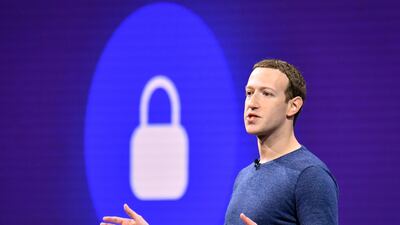Cast your mind back 15 years and consider this: how much of your personal information was readily available to strangers?
Facebook had just launched. The iPhone was still over three years away. Yes, you probably had a few loyalty cards and – whisper it – maybe even a Myspace account, but you could attend a job interview confident in the knowledge that an embarrassing photo of you wasn’t lurking on the internet waiting to be found. You could also be reasonably certain that the prosaic personal data you had shared was relatively safe.
As we approach 2020, everything has changed. Most of us volunteer so much information today that a 20:20 vision of us can be created from our activity online. From spending habits to political persuasions, via health, wealth, family and relationships, almost nothing is sacred. What’s more, this information is looking increasingly vulnerable.
At Gisec in Dubai last week, hacker Kevin Mitnick showed stunned delegates how easy it is to break open entire networks and plunder their content. Reports described his presentation as "eye-opening"; but given recent revelations from the world of Big Tech, it should also have been unsurprising. As we digitise our lives, digesting and divesting information wherever we go, our individual data trails are becoming unmanageably long.
The bad news for tech companies is that governments are waking up. There is growing recognition from those businesses with most to lose that perhaps they have more to gain by admitting they need help; even if that request encompasses a desire to share responsibility and blame. A problem shared is a problem halved – at the very least.
Mark Zuckerberg began his campaign in earnest last week, with an OpEd in The Washington Post aimed at getting his platform ahead of future internet regulation. It came with a plethora of Facebook announcements, partly as a reaction to criticism of its inability prevent the spread of horrifying live footage broadcast during the Christchurch Mosque killings.
Mr Zuckerberg called for "new rules" for the internet, focusing on harmful content alongside legislation to safeguard elections, privacy and data. All very valid points, but as Facebook furiously wiggles the bolts on its stable doors, it is hard to escape the view that numerous prize stallions have already galloped away.
In fact, one such horse was still prancing about outside: as Mr Zuckerberg’s plan was published, cybersecurity firm UpGuard announced it had found hundreds of millions of Facebook records held "in plain sight" on Amazon’s cloud computing service.
It's not just about data privacy; social media’s role in influencing politics remains an unanswered question. The Mueller Enquiry may have found little evidence of collusion between the Trump campaign and Russia ahead of the 2016 elections, but US intelligence experts have already concluded Russian digital interference took place.
Meanwhile, I have been camped outside the UK Houses of Parliament for the past three weeks as the country tears itself apart over Brexit. Digital disinformation may have played a key role there too: a UK parliamentary committee enquiry into fake news was highly critical of the Leave campaign and described British electoral law as "not fit for purpose" in the digital age.
Britain and America are just two examples among many. In the face of this, social media firms like Facebook face a huge challenge to regain trust. Even those with an intimate understanding of Facebook are raising the alarm. “Things that are good for us individually, fun for us, can still cause us great harm,” Roger Macnamee, a former mentor of Mr Zuckerberg, told me recently. “We have to find a balance that protects people from the harm that's caused by them.”
“Technology has taken a bad turn,” he continued. “It used to be about empowering people. Steve Jobs used to say it was like a bicycle for the mind. We need to get back to that.”
The question is, how? Investors appeared to snooze through Facebook’s announcements last week, as well as new revelations of data privacy laxity. Herein lies the rub: when investors don't punish social media companies by selling stock, when advertisers don’t shift their budgets, and – crucially – when we as users don't delete our accounts, there is little incentive for change. Facebook remains the dominant social channel in the UAE, where over 97 per cent use it.
The past 15 years have seen a technological shift, but also a cultural one; many people appear too relaxed or simply unaware they are trading data and privacy in exchange for social connectivity. The algorithms involved have also created an echo chamber of like-minded views that makes us vulnerable to misinformation. A recent study by SIS and McAfee showed the UAE is among those countries being particularly targeted by cybercriminals.
Mr Zuckerberg called for "global action" in his OpEd. Perhaps he is right; but we shouldn’t wait for Big Tech or governments to step up.
The onus is on us, and we owe it to ourselves and the next generation to act fast.
First Move with Julia Chatterley airs weekdays at 6pm on CNN International

